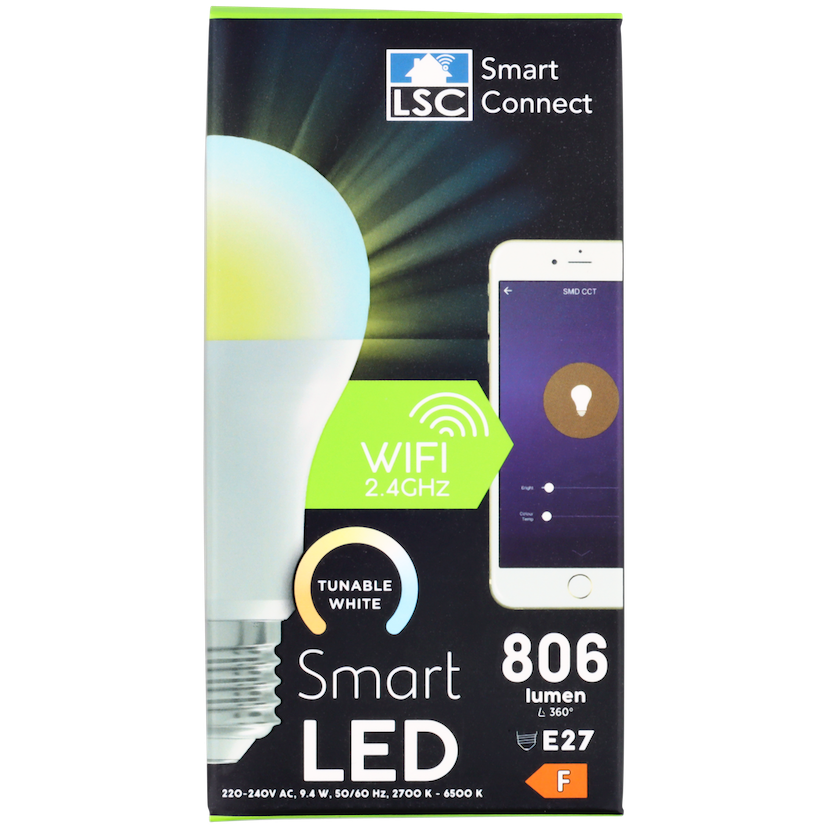LSC Light White Ambiance 3000272
Warning
The latest LSC Light White Ambiance 3000272 devices use the Tuya BK7231T module, which is not compatible with ESPHome!
Notice
- This light is flashable using the latest tuya-cloudcutter with a compiled ESPHome binary.
- The LEDs are controlled by 2 PWM output (Cold and White channels).
- The PWM are ingested into a BP5772 chip (Tuya).
Product Images

GPIO Pinout
| Pin | Function |
|---|---|
| P24 | Cold White (PWM) |
| P26 | Warm White (PWM) |
Basic configuration
substitutions:
name: lsc-light-warm-01
friendly_name: lsc-light-warm-01
esphome:
name: ${name}
friendly_name: ${friendly_name}
libretuya:
board: generic-bk7231t-qfn32-tuya
framework:
version: dev
# Enable logging
logger:
# Enable Home Assistant API
api:
encryption:
key: !secret api_encryption_key
ota:
password: !secret ota_password
wifi:
ssid: !secret wifi_ssid
password: !secret wifi_password
# Enable fallback hotspot in case wifi connection fails
ap:
ssid: "Lsc-Light-Warm-01"
password: ""
#web_server:
# port: 80
sensor:
- platform: wifi_signal
name: "WiFi Signal Sensor"
update_interval: 60s
- platform: uptime
name: Uptime Sensor
id: uptime_sensor
update_interval: 60s
on_raw_value:
then:
- text_sensor.template.publish:
id: uptime_human
state: !lambda |-
int seconds = round(id(uptime_sensor).raw_state);
int days = seconds / (24 * 3600);
seconds = seconds % (24 * 3600);
int hours = seconds / 3600;
seconds = seconds % 3600;
int minutes = seconds / 60;
seconds = seconds % 60;
return (
(days ? to_string(days) + "d " : "") +
(hours ? to_string(hours) + "h " : "") +
(minutes ? to_string(minutes) + "m " : "") +
(to_string(seconds) + "s")
).c_str();
text_sensor:
- platform: template
name: Uptime Human Readable
id: uptime_human
icon: mdi:clock-start
- platform: wifi_info
ip_address:
name: IP Address
entity_category: diagnostic
binary_sensor:
- platform: status
name: Status
entity_category: diagnostic
button:
- platform: restart
id: restart_button
name: Restart
entity_category: diagnostic
output:
- platform: ledc
id: output_cold_white
pin: P24
- platform: ledc
id: output_warm_white
pin: P26
# Example configuration entry
light:
- platform: cwww
name: ${friendly_name}
id: the_light
cold_white: output_cold_white
warm_white: output_warm_white
cold_white_color_temperature: 6536 K
warm_white_color_temperature: 2000 K
constant_brightness: true
effects:
- random:
name: "Slow Random"
transition_length: 30s
update_interval: 30s
- random:
name: "Fast Random"
transition_length: 4s
update_interval: 5s
- strobe:
- flicker:
alpha: 50% #The percentage that the last color value should affect the light. More or less the “forget-factor” of an exponential moving average. Defaults to 95%.
intensity: 50% #The intensity of the flickering, basically the maximum amplitude of the random offsets. Defaults to 1.5%.
- lambda:
name: Throb
update_interval: 1s
lambda: |-
static int state = 0;
auto call = id(the_light).turn_on();
// Transtion of 1000ms = 1s
call.set_transition_length(1000);
if (state == 0) {
call.set_brightness(1.0);
} else {
call.set_brightness(0.01);
}
call.perform();
state += 1;
if (state == 2)
state = 0;
## Blink the light if we aren't connected to WiFi.
## Uncomment below
#interval:
#- interval: 500ms
# then:
# - if:
# condition:
# not:
# wifi.connected:
# then:
# - light.turn_on:
# id: the_light
# brightness: 50%
# transition_length: 0s
# - delay: 250ms
# - light.turn_off:
# id: the_light
# transition_length: 250ms